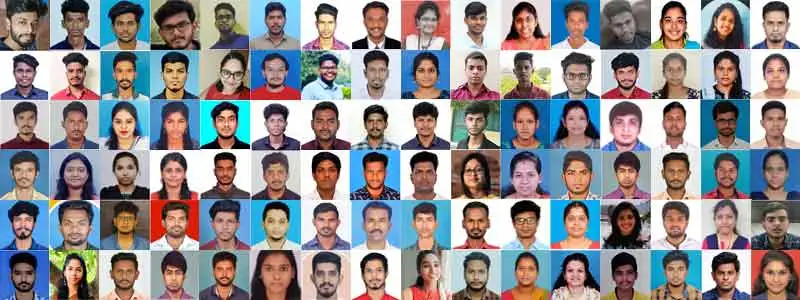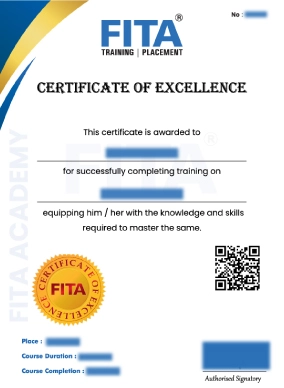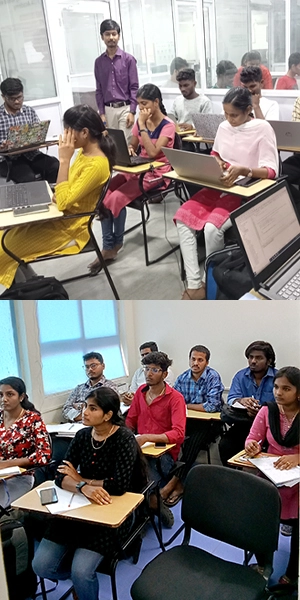Course Highlights and Why Oracle Training In Bangalore at FITA Academy?
Upcoming Batches
- 17-04-2025
- Weekdays
- Thursday (Monday - Friday)
- 19-04-2025
- Weekend
- Saturday (Saturday - Sunday)
- 21-04-2025
- Weekdays
- Monday (Monday - Friday)
- 26-04-2025
- Weekend
- Saturday (Saturday - Sunday)
Classroom Training
- Get trained by Industry Experts via Classroom Training at any of the FITA branches near you
- Why Wait? Jump Start your Career by taking the Oracle Training in Bangalore!
Instructor-Led Live Online Training
- Take-up Instructor-led Live Online Training. Get the Recorded Videos of each session.
- Travelling is a Constraint? Jump Start your Career by taking the Oracle Online Course!
Syllabus
Getting to know about Database
- What is Database?
- Oracle Database
- Normalization
- Data Model
Kinds of SQL Languages
- DDL(Data Definition Language): Alter, Drop, Create, TRUNCATE
- DML (Data Manipulation Language): Update, Select, Insert, and Delete
- DCL(Data Control Language): GRANT, Revoke
- TCL(Transaction Control Language): ROLLBACK, COMMIT, and SAVEPOINT
Select Statement & Condition Types
- List the Capabilities of all the SQL Select Statements
- Select All Columns
- Select Particular Columns
- Use the Column Heading Defaults
- DESC Command
- Conditions Types: IN, AND, OR, BETWEEN, NOT IN, LIKE, IS NULL, IS NOT NULL, & EXISTS
Sort Group, Restrict, Filter Data
- How to Restrict the Data while using the WHERE Clause
- Operators
- Precedence of Operators
- Sort the data by using the Order By Clause
- Grouping of the data by using a Group By Clause
- Filtering the groups of Date by using the Having Clause
Data Types
- Character
- Number
- Long and Row
- Large Object Data Types
- Pseudo Columns
- Date & Time
SQL Constraints
- Foreign Key Constraint
- Primary Key Constraint
- Unique Constraint
- Not Null Constraint
- Check Constraint
- Default Constraint
- Guidelines to Add, Remove, Alter Constraints
SQL Joins
- Outer Joins
- Inner Join
- Right Outer Join
- Left Outer Join
- Semi Join
- Self Join
- Anti join
- Union, Intersect, Union All, Minus
SQL Functions
- What is Single Row Functions
- NULL - Related Functions: LNNVL, NANVL, NVL, COALESCE, and NVL2
- Character Functions: CONTACT, CHR, LPAD, LOWER, LTRIM, NLSSORT, , RPAD, RTRIM, REPLACE, SUBSTR, TRIM UPPER, INSTR, LENGTH, & ASCII
- Numeric Functions: CIEL, ABS, MOD, FLOOR, POWER, ROUND, SIGN, TRUNC, and REMAINDER
- Date/Time Functions: CURRENT_DATE, CURRENT_TIMESTAMP, ADD_MONTHS, MONTHS_BETWEEN, SYSDATE, SESSIONTIMEZONE, SYSTIMESTAMP, TO_TIME STAMP, TZ, TURNC(DATE)
- Conversion Functions: Cast, Convert, ASCIISTR, HEXTORAW, RAWTOHEX, TO_CHAR (NUMBER), TO_CHAR (character), TO_DATE, TO_NUMBER, TO_CHAR (DATETIME)
- Conditional Functions : DECODE, CASE
- CaseConversion Functions: UPPER, LOWER, and INITCAP
- Multi-Row SQL Functions: MIN, AVG, COUNT, MAX, SUM
- Analytic Functions: WM_CONCAT, LAG, LEAD, RANK, DENSE_RANK
Subqueries
- Understand What a Subquery is?
- Inline Sub Query
- Scalar Sub Query
- Scalar sub-Query Caching
- The Recursive WITH Clause
- Invoke the WITH Clause
Multi-Row Insert and Set Operators
- Condition FIRST Insert
- Insert All, Insert Using the Sub Query
- Set Operators: UNION, UNION ALL, INTERSECT, MINUS
Hierarchical Data Retrieval, and Nth row
- Connect by the Prior
- Connect by the ROWNUM
- Connect By level
- Start With
- Nth row using the Rank, ROWNUM, and DENSE RANK Functions
Views, Synonyms, Sequence, Materialized View
- Simple view
- Complex Views
- DML Operations of the View
- With Check Option
- Only With Read Option
- Inline Views
- Materialized View - Refresh, Drop, Create, Usage
- Synonym Creation
- Granting Access to the Synonyms
- Sequence Creation CURRVAl, NEXRVAL of Sequence
Oracle PL/SQL - PL/ SQL Basics
- What do you mean by PL/SQL
- Basics of PL/SQL
- PL/SQL Data kinds
- Block Structure
- Scope & Variable
- SET Serveroutput on
- Comment
PL/SQL Conditions
- Knowing about IF-THEN
- Get to know IF THEN ELSE
- IF THEN ELSIF
- Understanding NESTED IF
- Learning about CASE
- Difference between CASE and DECODE
PL/SQL Loops
- Learning about Basic LOOP Statement
- Understand EXIT Statement
- Learn EXIT WHEN Statement
- Understand CONTINUE Statement
- Continue with When Statement
- Understand FOR Loop Statement
- Get to know about WHILE LOOP Statement
- Control between Loops
- GOTO Statement
- Labeling the Loops and Blocks
- Control Flow in the Block
Functions and Procedures
- What is Procedure
- Understand the Difference between Anonymous Block and Procedure
- Creating the Procedure
- Input and Output parameters for a Procedure
- Compiling and Executing Procedures
- Calling Procedures from Other Procedures, Functions, Packages Etc.
- Creating Private Procedures
- What is Function?
- Differences between Procedure and Function
- Creating a Function
- Input and Output Parameters to a Function
- Compiling and Executing Function
- Calling Functions from other Functions, Procedures, Packages, etc., ∙ Overloading Procedure and Function
PL/SQL Cursor
- What is a Cursor
- Implicit and Explicit Cursors
- Cursor Variables
- OPEN, FETCH, CLOSE, EXIT Cursor
- Cursor Attributes
- Ref Cursors
Dynamic SQL
- Execution of Immediate Statement
- OPEN FOR, CLOSE, and FETCH Statements
- Repeated Placeholder Names in the Dynamic SQL Statements
- Knowing about the DBMS_SQL Package
- DBMS_SQL. TO_CURSOR _NUMBER Function
- DBMS_SQL.TO_REFCURSOR Function
- Kinds of SQL Injection
- Types of SQL Injection Techniques
- Guard against the SQL Injection
- JDBC Exception
Trainer Profile
- The Oracle Tutors in Bangalore at FITA Academy Expands your knowledge of the Oracle by training extensively on the theoretical and practical approach
- The Oracle Trainers at FITA Academy are Experienced Professionals from the Database domain with 10+ years of Experience
- The Oracle Instructors at FITA Academy provides an equal individual focus for all the participants of the Oracle Course
- The Oracle Mentors at FITA Academy profoundly explains how to retrieve, store, and extract the data from the Database in real-time
- The Oracle Trainers at FITA Academy have worked on more than 25+ Database projects and they share their experiences and knowledge with the students
- The Oracle Tutors at FITA Academy guides and assist the students in clearing the global certification exams that are conducted by Oracle
- The Oracle Instructors at FITA Academy prepares you proficiently to work with the Oracle Database environment and what are the skills that are needed for a Workspace Environment
Learn at FITA Academy & Get Your
Dream IT Job in 60 Days
like these Successful Students!
Features of Oracle Training In Bangalore at FITA Academy
Real-Time Experts as Trainers
At FITA Academy, you will learn from industry experts eager to share their knowledge with learners. You will also get personally mentored by the Experts.
LIVE Project
Get the opportunity to work on real-time projects that will provide you with deep experience. Showcase your project experience and increase your chances of getting hired!
Certification
FITA Academy offers certification. Also, get ready to clear global certifications. 72% of FITA Academy students appear for global certifications and 100% of them clear it.
Affordable Fees
At FITA Academy, the course fee is not only affordable, but you can also pay it in installments. Quality training at an affordable price is our motto.
Flexibility
At FITA Academy, you get the ultimate flexibility. Classroom or online training? Early morning or late evening? Weekday or weekend? Regular Pace or Fast Track? - Choose whatever suits you best.
Placement Support
Tied-up & signed MOUs with over 3000+ small & medium-sized companies to support you with opportunities to kick-start & advance your career.
Why Learn Oracle Training In Bangalore at FITA Academy?
Live Capstone Projects
Real time Industry Experts as Trainers
Placement Support till you get your Dream Job offer!
Free Interview Clearing Workshops
Free Resume Preparation & Aptitude Workshops

Oracle Certification Training Institutes in Bangalore
On the successful accomplishment of the Oracle Course in Bangalore at FITA Academy the students of the training course will be rewarded with the course completion certificate. This Certificate demonstrates that the candidate of the Oracle Training has gained the required technical competence and skills of the Oracle Database environment. Besides FITA Academy’s Oracle Course Completion Certificate, the Trainers at FITA Academy encourage the students to take up the global certification exams namely – Oracle Certified Junior Associate (OCJA), Oracle Certified Associate (OCA), Oracle Certified Professionals (OCP), and Oracle Certified Master (OCM).
Have Queries? Talk to our Career Counselor for more Guidance on picking the
right Career for you!
Placement Session & Job Opportunities after completing Oracle Training In Bangalore

There is a significant demand for Oracle Developers in the marketplace. Today Enterprises of a broader range are looking for skilled and competent professionals who can proficiently work on the Oracle Software. Oracle is one of the promising and compelling fields that brings IT Professionals enormous benefits namely job security, global demand, the flexibility of work, handsome of packages, and a rewarding future. Some of the top recruiters of the Oracle skilled professionals are; IBM, Oracle, AT&T, Verizon Communications, TCS, Wells Fargo, CITI, Accenture, HP, Bank of America, Infosys, JP Morgan Chase, and HCL. The common job profiles that are offered in these companies are Oracle Developer, Oracle Administrator, Database Administrator, Database Developer, Business Analysts, and Data Analysts. The median remittance offered to an Oracle Developer in Indian is Rs. 3,70,000 to Rs. 4,70,000.
The Oracle Training in Bangalore at FITA Academy instills the students of the training course with mandatory technical skills and knowledge that are required for a Workplace environment. The Oracle Tutors at FITA Academy real-time Oracle Database Developers and they guide the students in upskilling their skills and knowledge.
Success Story of Oracle Training In Bangalore
Chaitnya Belgavi
The Oracle Training in Bangalore at FITA Academy was superb. I learned about the PL/SQL concepts in-depth. The Program was cohesive to the current demands in the industry. The program had a good focus on Placement Support as well. Overall I found this training useful and freshers can surely go with this course!
Ardian Edith
I joined FITA Academy for the Oracle training. The Oracle Trainers at FITA Academy were highly proficient. They thought us everything in detail. What I liked most here are the training practices. They identified intricacies in the learning process and cleared them immediately. That was the best part of this course.
Sowmya Somasundaram
The Oracle Course @ FITA Academy was completely hands-on and it was insightful. Good coverage of the Oracle Syllabus with Rigorous Assessment practices. The Oracle Classes were also assigned flexibly here! I am so happy that I chose the correct platform and I recommend this Course to all the freshers! Excellent work FITA Academy!
Gagan Dasannanavar
Completed the Oracle Training @ FITA Academy! First, my sincere thanks to my Oracle Trainer who had helped me in making to understand the concepts quickly. I must say he was really calm and patient enough to clear all my doubts. Before FITA Academy, I just had only an outline view of What a Database is all about! But over here I got the complete picture and role of Database in organizations.
Our Students Work at

Frequently Asked Question (FAQ) about Oracle Training In Bangalore

Oracle Software was founded by an American-based technology enterprise that is specialized in Database Software. Oracle is the leading Supplier of Software that supports developers in Relational Database Products and Information Management. And recently it has been outperforming well in the Cloud Product and Services. The Oracle makes a Software called DBMS – the Database Management System for managing and building databases and the RDMS – Relational Database Management System. The Oracle RDMS is the compilation of the Data that are organized by the type in a relationship that is being handled between different kinds. The main purpose of the Database is to retrieve and store the related details.
This Database Software occupies the predominant position in most Corporate & IT environments for supporting different purposes like Business Intelligence, Transaction Processing, and Analytics Applications. Oracle Corp was the first and foremost enterprise to commercialize the RDMS platform and it is one of the leading database vendors with wider customers across the globe. The reason behind the mammoth growth of the Oracle Database Software is owing to its features.
The Oracle Database is a cross-platform that shall run on different hardware across the Operating systems and this includes the Unix, Windows Server, and different Distribution of the Linux/GNU. Further, it has a Networking stack that shall permit the applications from various platforms to communicate with the Oracle Database seamlessly. For instance, the application that runs on Windows can easily connect to the Oracle Database that runs on the Unix. The ACID-Compliant is an important feature of the Oracle Database that aids the organization to handle data reliability and integrity.
The other important features of the Oracle are
- Logical Data Structure – The Oracle makes use of the Logical Data Structure for storing the data to interact with the other database without even understanding where the data are stored physically
- Partitioning – It is one of the remarkable features of the Oracle software that permits you to partition a large table into various pieces and storing all pieces among different storage devices
- The Data Dictionary is the Set of Internal Views and Tables that supports the administer of the Oracle Database effectively
- Memory caching is the architecture that permits you to scale up the large database that can perform at a rapid pace
- Recovery and Backup – It ensures the integrity of the data in terms of System failure. The Oracle includes the powerful tool named Recovery Manager – which permits the DBA for performing the hot, cold, and incremental database back-ups and the point-in-time recoveries.
- Clustering – The Oracle Real Application Cluster – The Oracle supports high availability that allows the systems to run without any interruption of the services in the event of one or more cluster failures in the server.
These are the features that have covered the audiences of a wider range to transit themselves to the Oracle Database platform the storage and retrieval of Data. The Oracle Training in Bangalore at FITA Academy trains the students holistically on the Oracle Database software and its application under the mentorship of Real-time Oracle Developer Professionals. By the end of the Oracle Course at FITA Academy, you would have imbibed all the Job-oriented skills that are required for an Oracle Developer.


